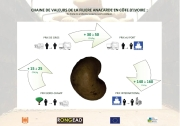The below is content from a FrontlineSMS Community Forum blog post, by FrontlineSMS user Julien Gonnet.

RONGEAD is a non profit organisation in Côte d'Ivoire which helps facilitate small producers in Africa to gain better access to markets. In Côte d'Ivoire they transmit information on the cashew market via SMS. This is a big job, considering Cote d'Ivoire is the second largest exporter of raw cashews, generating incomes for approximately 250,000 producers. RONGEAD are regularly in contact with producers of cashews in five regions of the country, and they use FrontlineSMS to send 3,000 SMS every week providing up to date information on market prices. In addition they provide valuable training and educational materials.
Julien Gonnet, of RONGEAD, recently shared details on our FrontlineSMS community forum about how they have set up a project to enable more than 8000 producers and 250 peasant leaders to have access to the information, tools, knowledge and skills which can help to enhance and secure revenue sources. The project involves "creation of a proactive network of shared knowledge of the world market for cashew value chain in Cote d'Ivoire."
This project has thus far provided five training modules for the producers and peasant leaders. The training modules address particular descriptions of the industry (covering main actors and relationships), an explanation for the formation and evolution of the price (including information on changes in supply and demand), and guidance on market decision making, such as when to sell and how to store goods effectively. A dozen educational materials - as shown in images here - have been developed during the project, including a role play!
At the level of information dissemination, each week, a market analysis is performed by relevant two specialists in the sector in Côte d'Ivoire and France. These summaries are released in a variety of ways, including as an electronic newsletter, though local radio and through 3000 SMS, differentiated by region, sent each week by FrontlineSMS.
This RONGEAD project has caused a great excitement, by providing accessible to information and training. Plus it has helped create relationships of solidarity between local producers. In the past relationships have been diminished following the stigma affecting certain cooperatives, and the climate of suspicion within a sector perceived as opaque and unstructured. Therefore, it is good to find positive projects which counteract this.
Julien points out that the objective of RONGEAD's project is not "simply to disseminate collected prices, but add elements of market understanding." As he explains "it is necessary to assist producers receiving the information to promote their own decision making and avoid counter-productive misunderstandings."
To learn more about the work of RONGEAD visit their website: http://www.rongead.org
Please feel free to join the FrontlineSMS Community Forum to connect with other FrontlineSMS users, and share details of how you are using FrontlineSMS too!



 "I am a veterinarian by qualification but, as often happens in life, ended up working with information and communication technologies... applied to agriculture. And I have no regrets. For some time I have been interested in the application of technology in agriculture, and these days I am particularly excited by the potential of mobile technologies in helping small producers improve the marketing of their products.
"I am a veterinarian by qualification but, as often happens in life, ended up working with information and communication technologies... applied to agriculture. And I have no regrets. For some time I have been interested in the application of technology in agriculture, and these days I am particularly excited by the potential of mobile technologies in helping small producers improve the marketing of their products.